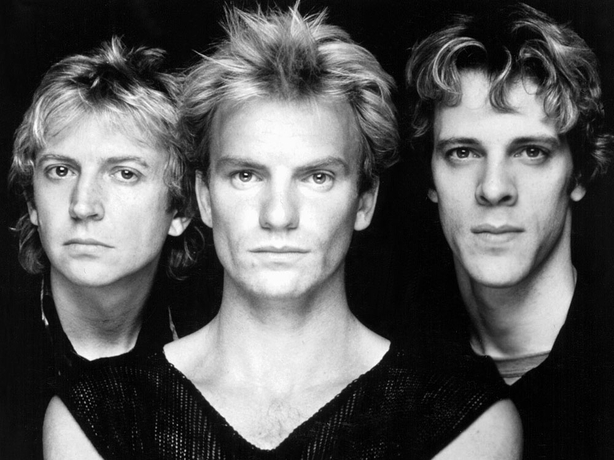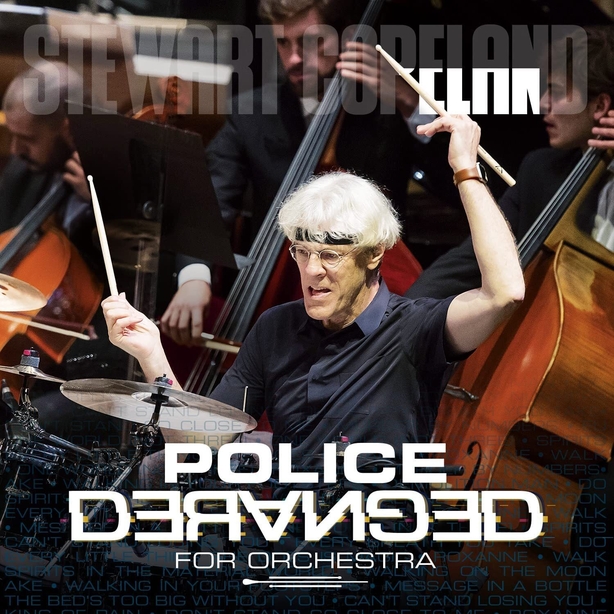From his work in film, opera, and orchestra to being the drummer and co-founder of The Police, Steward Copeland is a true master of music.
In his latest project, The Police Deranged for Orchestra, he's bridging two genres of music by deconstructing some of the greatest hits of The Police in a truly unique way.
He joined RTÉ Arena’s Seán Rocks to talk about the new album and how an early life of "banging stuff" led all the way to worldwide fame - listen above.
He also touched on how 20+ years in film nurtured his talents and what it was like to revisit Every Breath You Take with a fresh perspective.
🥁 @SeanRadioRocks was joined by former drummer of Police, Stewart Copeland who talked about him and Sting recruiting guitarist Andy Summers into the band.
— RTÉ Radio 1 (@RTERadio1) June 15, 2023
Listen back to their full conversations here: https://t.co/FsFBm33xG9@RTEArena pic.twitter.com/mdznGG6pyD
The son of a high-ranking CIA officer who moved to Cairo, Stewart Copeland moved to Beirut and then London in the 1970s. While he may not have followed his father's footsteps into espionage, he did inherit a love of music.
"I’m the youngest of four siblings, and the first three went by, and he thrust instruments into their hands, which didn’t take until his fourth child came along, which is me," Copeland says.
"And I soon grabbed hold of all these musical instruments and started battering them, soon broke most of them. But had that ingredient that parents can recognise that they have a musician in the family."
"My father was very pleased, even though his job was toppling or propping up dictators. He was very pleased that one of his kids landed in music."
Early on, Copeland was put on trombone, which was easier to get a good sound out of. But his world changed forever when he discovered "banging stuff."
"I was a late developer. The runt of the litter. All my friends were starting to shave and become adult males, and I was sort of…not. When’s my turn?" he recalls.
"I felt kind of diminished. Until I banged on a drum and suddenly transformed in an instant to an 800-pound hairy-assed silver back, swinging through the trees, pounding logs; "Take that!" And this squeaky little 12-year-old suddenly became 'the big bad guy.’ Magic. For a young man, this was really important."
"For any musicians listening to this, I would offer this advice. Don't be afraid to sell out. Because when you work for 'the man,’ you’re forced to go places. And you will learn stuff. Sure, pursue your artistic vision, but don’t be afraid of doing bespoke music. You’ll learn stuff from it."
The early days of The Police
Before Andy Summers, The Police had a rather turbulent start. Copeland wrote four-chord songs, which he dubbed 'songs of convenience' so they could call themselves a punk band. He remembers trying to keep Sting excited about the band’s prospects "in spite of having no prospects" at the time.
That is until they met Andy Summers by chance at a session.
"In walks this triple-scale legendary, storied guitarist, name of Andy Summers. Driving home that night from that session, Sting is just seething, "We got to get that guy!"
"And I’m like, "Dude, I agree. [But] we’re not going to get that guy. We can’t afford him. There’s just no way we can entice him from his lucrative work as an expensive session guitarist to join our failed, fake punk band."
As fate would have it, the duo kept running into Andy, who took an interest in their band and called Sting one day to say those magical words, "Let’s do it!".
Copeland talks about how the trio solidified their friendship by sticking together and were "absolutely indestructible" at the time, saying:
"No one could steal Sting away from me – and everybody tried…And then Andy decided to join the two of us, a fake punk band...with that harmonic sophistication, Sting’s musical ears pricked up, and that’s when he started writing those songs. And the rest is history."
"Getting into these songs, I was forced to discover – and don't tell Sting I said this – but the man is somewhat of a genius! At both music and lyrics."
The foundations for The Police Deranged
On playing a sample of Message in the Bottle from The Police Deranged, Copeland highlights that there’s a strong Irish connection present, saying:
"You might have noticed the excellence of the orchestra on that track there. The reason why they are so conspicuously excellent is because it was in Dublin! Those are Irish players! So we recorded the orchestra right there in Dublin town."
While there’s no date for an Irish concert, Copeland promises Seán he’s "working on it" and wants to bring the experience to Dublin soon.
On how he managed to deconstruct The Police for orchestra, Copeland says his 20 years spent as a film composer helped "put ink on the page" and now appreciates the orchestra for being "the most magnificent instrument" that can "do anything."
That film experience was easily transferable to his current project, and on reflection, he had this advice for musicians listening:
"For any musicians listening to this, I would offer this advice. Don’t be afraid to sell out. Because when you work for ‘the man,’ you’re forced to go places. And you will learn stuff. Sure, pursue your artistic vision, but don’t be afraid of doing bespoke music. You’ll learn stuff from it."

On Every Breath You Take and recognizing Sting’s ‘genius.’
Speaking on what it felt to re-examine the Police from a new perspective, Copeland admits:
"I didn't know what [Sting] was singing about back in the day. I was at the back of the stage, banging stuff. All I ever saw was the back of the head. Who knows what he was yelling to the audience?"
"But getting into these songs, I was forced to discover – and don’t tell him I said this – but the man is somewhat of a genius! At both music and lyrics."
Copeland refers to Sting almost like an 'older brother’ whom he still wants to impress and says he was grateful Sting was "all over" the project when he sent it over.
Closing the interview, Seán touches on one of the biggest hits from The Police – Every Breath You Take. How was re-examining that hit for Copeland?

"It was originally a song that Sting brought to our last album sessions," Copeland recalls. "It was a demo he had of him playing like a Hammond organ and singing that song. And we knew just from that, ‘It’s a hit.’ That’s the biggest song we’ve ever done."
Reworking the song for the Deranged project allowed Copeland the chance to understand the song’s darker, "stalker" lyrics, something Copeland again praises Sting for.
"That is the thing Sting is most proud of. He loves it when people come up and say, "We played that at our wedding." And he smirks. So do I."
"I discovered all this when doing Derangements, is that old Stingo quite clever with the lyrics; you think it’s about this – when in fact, it’s about that."
Stewart Copeland: The Police Deranged For Orchestra is out now.


